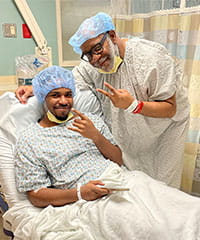Basketball is a mainstay in the Moses family. Langston (19) played throughout high school and trains younger kids – his family says he has “a basketball mind.” They also describe him as “the life of the party,” “fire of the family,” and someone who can change the dynamic of a room just by entering. More than anything, his dad, Darnell, notes that Langston is the kind of person who will do anything for others. Langston’s generous spirit was most evident when he stepped up to become his father’s living-liver donor in March 2023.
The Condition: Metabolic Dysfunction-associated Steatotic Liver Disease
Darnell lived with metabolic dysfunction-associated steatotic liver disease (MASLD) – previously called non-alcoholic fatty liver disease or NAFLD – for many years. He eventually began to experience the effects of cirrhosis, and his hepatologist, Dr. Jaideep Behari, found a cancerous lesion on his liver in August 2022. Since Darnell had cirrhosis, Dr. Behari advised that a liver transplant was his best treatment option to cure the liver cancer.
Given his MASLD diagnosis, Darnell always knew that a liver transplant was possible. “It’s not that I didn’t take that seriously, but it didn’t really hit me until he actually said those words that I was going to have one,” he says.
The Path to Living-Donor Liver Transplant
The UPMC Liver Transplant Program team spoke with Darnell about the benefits of living-donor liver transplant, including the ability to receive a transplant sooner. Living-donor liver transplant occurs when an individual donates a portion of their healthy liver to someone with advanced liver disease. This is possible because of the liver’s ability to regenerate in the recipient and the donor.
Darnell and his wife discussed treatment options before sharing the news about his progressing condition with their two sons. They also shared information about living donation during that conversation.
Langston was first to undergo the living donor evaluation, and the family waited nervously to hear if the two were a match.
He says, “I really took this as an opportunity to help out and at least get checked early so if I wasn’t a match, someone else could get checked and it wouldn’t be a long waiting situation.”
They received good news about a week later when they learned that Langston was a match. Due to Darnell’s declining condition, Langston immediately volunteered to move forward with the transplant, and it was scheduled for two weeks later.
“I was grateful that Langston was a match, but it was still bittersweet,” says Darnell. “He loves playing basketball, and he’s had some injuries and was just getting to a point where he got his stamina back. He was playing really well, and now he was going to put all that on hold for me.”
A Son’s Gift
Darnell and Langston were nervous on surgery day. In addition to thinking about Langston, Darnell was thinking about his wife who had two family members in operating rooms. He also recognized that she would soon become a caretaker for both of them. Luckily, she had friends and family surrounding her, including their oldest son Thurgood who returned home from college to support his family.
A “nice big hug” with his parents calmed Langston’s pre-surgery nerves, and after that he says he was “all good and ready to go.”
Both surgeries went well, and Langston was able to visit his father in his hospital room the next day. They were thrilled to reunite, and they marked the occasion by watching a college basketball game on TV.
The family is grateful for the care they received at UPMC, particularly from the nursing staff. “Every single nurse I had was absolutely amazing,” says Darnell.
Clear and thorough communication from the surgical team of Drs. Abhinav Humar and Christopher Hughes also helped Darnell and Langston feel more comfortable throughout the process.
Langston says, “I trusted my doctors the whole way.”
The Result: Pursuing Their Passions
Langston is back to playing basketball. He plans to earn a business degree and later follow in his dad’s footsteps by attending law school. Darnell is back to work as deputy director at a local non-profit agency that works toward establishing sustainable communities. He is walking for exercise and looks forward to golfing once doctors clear him to return to the sport.
Darnell and Langston are grateful for the support they received from family throughout the process, and Langston enjoys sharing his experience with friends who ask about living donation.
“It makes me happy that everyone was so thoughtful,” he says.
Darnell has always been close with his children and recognizes that his son went above and beyond. “I would do anything for my kids, and I knew that my sons would do anything for me. This young man saved my life.”
Darnell and Langston’s treatment and results may not be representative of all similar cases.

















